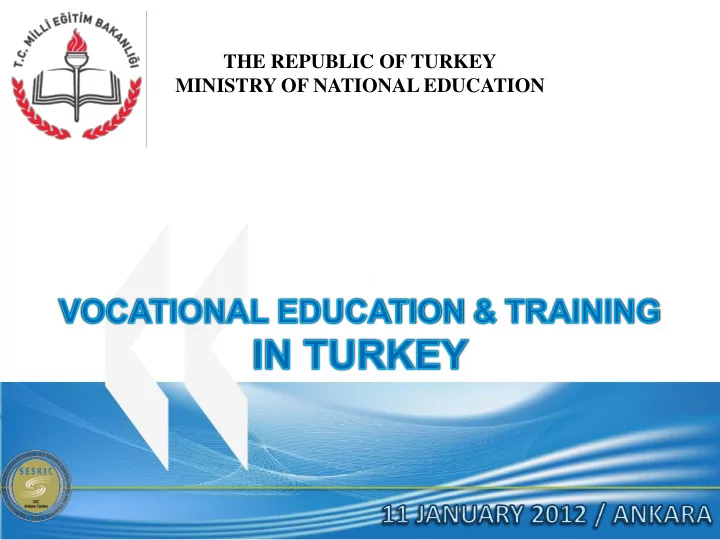

THE REPUBLIC OF TURKEY MINISTRY OF NATIONAL EDUCATION
Today, vocational education and training has an important status all over the world. Vocational education and training based on knowledge, skills and competences has gradually been gaining significance. It has been aimed that vocational education and training; is realised in line with the demands and requirements of the labour markets, is conducted in a participatory-approach within the context of school- institution-sector cooperation, is given in such a way that the graduates could be employed internationally, is developed continuously and its quality is improved.
In line with the developments in the world and sectoral demands, structural reforms were and still being done in vocational education and training starting from the year 2003 through the following projects : Strengthening The Vocational Education and Training System in Turkey – SVET (European Union) (2003-2007) (51 Million Avro) Modernisation of Vocational Education and Training in Turkey – MVET (European Union) (2003-2007) (18,5 Million € ) The Project of Developing Human Resources Through VET – IKMEP (European Union) (2007-2010) (16,4 Million € ) Secondary Level Education Project (World Bank) (2007 - 2011) (80 Million € )
Within the context of re-structuring, the finacial resources invested in the development of VET in Turkey since 2003: Foreign Resources MEGEP : 51,0 Milyon Avro MTEM : 18,5 Milyon Avro İKMEP : 16,4 Milyon Avro Orta Öğretim Projesi : 80,0 Milyon Avro TOTAL : 165.9 Million € National Resources 2004-2011 (Including staff costs) : 9.2 Billion € TOTAL : 9.366 Billion €
Throughout these projects in which internationally-valid vocational tools and standarts such as EQF, ECVET, EQAVET, EUROPASS, ISCO88, ISCED97 and FOET were taken into consideration, the activities were/have been carried out in cooperation with the following “ social partners ” institutions/organisations as at planning, implementation and evaluation stages; NGOs (TOBB, TÜSİAD,TESK) Trade Unions (TİSK,TÜRK - İŞ, DİSK VE HAK- İŞ) Higher Education Council (YOK) and Universities, State Planning Organisation (SPO), Other Related Ministries
Turkish National Education System has two main parts: (1) Formal Education: (regular education provided in formal schools) Pre-school education Primary education Secondary education Higher education (2) Non-formal Education: (all educational and training activities organized in addition to or except from formal training) Public training Apprenticeship training Distance education Certificate trainings provided by NGOs Training provided by other institutions / organisations such as İSKUR and municipalities
VOCATIONAL & TECHNICAL EDUCATION SCHOOL TEACHER STUDENT DG for Vocational and Technical 4.547 86.062 1.593.223 (2010-2011 Academic Year Schooling rate at secondary level education(total) : 93.34 % Schooling rate of girls at secondary level education : 87,31 % Schooling rate at technical and vocational education (total) : 36.12 % Schooling rate of girls in secondary VET : 32.00 %
HIGHER EDUCATION DIPLOMA W O R K 12 TH GRADE 18 L 11 TH GRADE 17 I CERTIFICATE F 10 TH GRADE 16 E 15 9 TH GRADE (COMMON WITH GENERAL HIGH SCHOOLS) YAŞ BASIC EDUCATION ADULTS
9 th ACADEMIC EDUCATION IN GENERAL ??? ACADEMIC SECONDARY SCHOOLS GRADE EDUCATION 9 th 10 th 12th GRADE 11 th GRADE GRADE GRADE VOCATIONAL TRAINING IN TRAINING IN TRAINING IN EDUCATION OCCUPATION OCCUPATION JOB FAMILY
MoNE “ CD ” experts international trainers experts CURRICULA teachers of academicians DEVELOPMENT field of education program sector coordinators representatives sector staff
LEVEL 8 DOCTORATE 7 POST-GRADUATION 6 (EXPERT) - 6. LEVEL CERTIFICATED - LICENCED (FOREMAN) - 5. LEVEL CERTIFICATED – TECHNICIAN 5 (MASTER) - 4. LEVEL CERTIFICATED – TECHNICIAN 4 (JOURNEYMAN) – 3. LEVEL / GRADE 3 (APPRENTICE) – 2. LEVEL / GRADE 2 PRIMARY EDUCATION 1
VOCATIONAL QUALIFICATIONS AUTHORITY was established in 2006, with the following functions and authorities below; To prepare the principles of national vocational qualifications system, based on the national vocational standards. To have occupational standards prepared, to determine the bodies who shall prepare the occupational NATIONAL standards. QUALIFICATIONS SYSTEM To validate the vocational qualification certificates held by the foreigners working in Turkey.
In order to further improve vocational education and training which has a dynamic structure in Turkey, some of the new important projects are as follows: Specialised VET Centres for Employment- UMEM (51 Million € ) (National) (2010-2015) Operation to Improve the Quality of VET- 1/2 (33 Million € ) (European Union) (2011-2015) Increasing Schooling Rate of Girls-1/2 (16 Million € ) (European Union) (2013-2015) The Project of Improving Lifelong Learning (15 Million € ) (European Union) (2009-2011) Movement of Increasing Opportunities and Improving Technologies – FATIH (National) (2010-2013)
The protocol was signed and put into effect on 23 June 2010 for the project titled “ Specialised VET Centres for Employment-UMEM ” prepared to improve the qualification of our young generation in order to increase their employability. The budget of this 5-year project is nearly 80 Million Dollars. PROJECT PARTNERS: Ministry of National Education (MoNE) DG for Vocational and Technical Education (MTEGM) Ministry of Labour & Social Security General Directorate of Turkish Employment Institution (İŞKUR) The Union of Chambers and Commodity Exchanges of Turkey (TOBB) TOBB University of Economics and Technology (TOBB ETU)
Objectives of the UMEM Project: To strengthen the technological infrastructure of the 140 secondary level technical and vocational schools selected 81 provinces, To provide in-service training to the teachers at the above-mentioned schools, To determine the demand for qualified work force in the provinces, to provide on-the-job training and unemployment to nearly 1 million trainees.
So far in the UMEM Project: Labour market analysis has been done by TOBB ETU University and thus the need for qualified workforce was determined at local sectors. Technological infrastructure of 140 secondary level vocational and technical high schools selected in cooperation of İŞKUR, MTEGM ve TOBB have been updated. In-service training of 6.084 teachers at the project schools has been going on in cooperation with the related sectors. VIDEO
THE REPUBLIC OF TURKEY MINISTRY OF NATIONAL EDUCATION
Recommend
More recommend